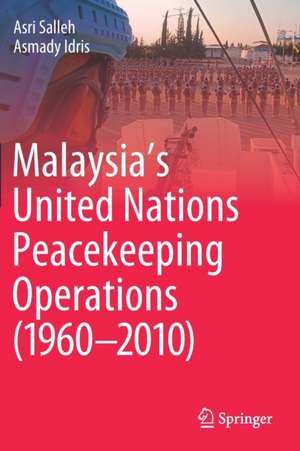Malaysia’s United Nations Peacekeeping Operations (1960–2010)
Autor Asri Salleh, Asmady Idrisen Limba Engleză Paperback – 6 ian 2022
This book fills the critical gap. It deliberates on the respective national and international decision-making processes, especially from the Malaysian point of view, and analyses the theoretical and practical impacts of Malaysia’s UNPKO in understanding international politics. Apart from providing a well-researched account of Malaysia’s UNPKO across the globe for 50 years, i.e. 1960-2010, this book examines the determinants by using qualitative data, particularly key-informant interviews and documentary analysis. Thus, while most studies of Malaysia’s UNPKO single out domestic imperatives as the most vital determinant, this book, on the contrary, comprehensively identifies the prevailing world security order as the most important determinant influencing Malaysia’s UNPKO, followed by the domestic ones.
| Toate formatele și edițiile | Preț | Express |
|---|---|---|
| Paperback (1) | 525.35 lei 6-8 săpt. | |
| Springer Nature Singapore – 6 ian 2022 | 525.35 lei 6-8 săpt. | |
| Hardback (1) | 700.94 lei 6-8 săpt. | |
| Springer Nature Singapore – 5 ian 2021 | 700.94 lei 6-8 săpt. |
Preț: 525.35 lei
Preț vechi: 618.05 lei
-15% Nou
Puncte Express: 788
Preț estimativ în valută:
100.53€ • 103.87$ • 83.63£
100.53€ • 103.87$ • 83.63£
Carte tipărită la comandă
Livrare economică 20 martie-03 aprilie
Preluare comenzi: 021 569.72.76
Specificații
ISBN-13: 9789813341395
ISBN-10: 9813341394
Pagini: 231
Ilustrații: XX, 231 p. 11 illus., 8 illus. in color.
Dimensiuni: 155 x 235 mm
Greutate: 0.36 kg
Ediția:1st ed. 2021
Editura: Springer Nature Singapore
Colecția Springer
Locul publicării:Singapore, Singapore
ISBN-10: 9813341394
Pagini: 231
Ilustrații: XX, 231 p. 11 illus., 8 illus. in color.
Dimensiuni: 155 x 235 mm
Greutate: 0.36 kg
Ediția:1st ed. 2021
Editura: Springer Nature Singapore
Colecția Springer
Locul publicării:Singapore, Singapore
Cuprins
Chapter 1. Introduction.- Chapter 2. Theoretical Framework.- Chapter 3. Structure and Process.- Chapter 4. Systemic-External Pressures and Malaysia’s UNPKO.- Chapter 5. Domestic-Internal Pressures and Malaysia’s UNPKO.- Chapter 6. Malaysia’s UNPKO in the Cold War and Post-Cold War Eras.- Chapter 7. The Interplay of Systemic-Domestic Pressures of Malaysia’s UNPKO.- Chapter 8. Conclusion.- Bibliography.- Appendix.- About the authors.- Index.
Notă biografică
Dr. Asri Salleh is a senior lecturer at the Faculty of Administrative Science & Policy Studies, Universiti Teknologi MARA, Sabah Branch (UiTM). Dr Asri earned his first degree and master's in political science (1999 & 2007) from International Islamic University Malaysia (IIUM) and his PhD in international relations (2017) from Universiti Malaysia Sabah (UMS). Dr. Asri's other seminal works include "Malaysia's Territorial Disputes 1963-2008". Dr Asri also writes regularly for various mainstream media.
Dr. Asmady Idris is Associate Professor and an International Relations scholar at the International Relations Programme, Faculty of Social Sciences and Humanities, Universiti Malaysia Sabah (UMS). Dr. Idris earned his M.A. and Ph.D. in International Relations from University of Newcastle upon Tyne, UK. He has written numerous books and articles on the Middle East-Asia Pacific relations, and other international relations issues.
Textul de pe ultima copertă
Small and developing states make up the majority of participants in United Nations Peacekeeping Operations (UNPKO), and Malaysia is one of these. The numerous previous studies on Malaysia’s UNPKO are primarily historical narratives which focus on practical, policy-related issues and due process, making no attempt to synchronize the nexus between theory and policy analysis. Nor do they cover the theoretical aspect which can operationalize and address the question of the roles played by Malaysia’s domestic actors (foreign policy executives, legislature, military, media, public opinion) in the respective decision-making processes as well as those of external level, such as international power politics and geopolitical considerations. In other words, they are predominantly a historical narrative of only several Malaysia’s UNPKO.
This book fills the critical gap. It deliberates on the respective national and international decision-making processes, especially from the Malaysian point of view, and analyses the theoretical and practical impacts of Malaysia’s UNPKO in understanding international politics. Apart from providing a well-researched account of Malaysia’s UNPKO across the globe for 50 years, i.e. 1960-2010, this book examines the determinants by using qualitative data, particularly key-informant interviews and documentary analysis. Thus, while most studies of Malaysia’s UNPKO single out domestic imperatives as the most vital determinant, this book, on the contrary, comprehensively identifies the prevailing world security order as the most important determinant influencing Malaysia’s UNPKO, followed by the domestic ones.
This book fills the critical gap. It deliberates on the respective national and international decision-making processes, especially from the Malaysian point of view, and analyses the theoretical and practical impacts of Malaysia’s UNPKO in understanding international politics. Apart from providing a well-researched account of Malaysia’s UNPKO across the globe for 50 years, i.e. 1960-2010, this book examines the determinants by using qualitative data, particularly key-informant interviews and documentary analysis. Thus, while most studies of Malaysia’s UNPKO single out domestic imperatives as the most vital determinant, this book, on the contrary, comprehensively identifies the prevailing world security order as the most important determinant influencing Malaysia’s UNPKO, followed by the domestic ones.
Caracteristici
Highlights the most comprehensive work on Malaysia's United Nations' Peacekeeping Operations (1960–2010) Presents an overview of Malaysia's foreign policy Discusses peacekeeping as a conflict resolution mechanism from a small power's perspective Includes special focus on the mechanics of UNPKO within the Security Council of the United Nations
